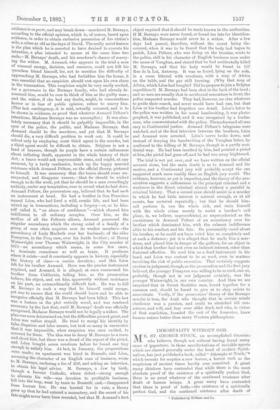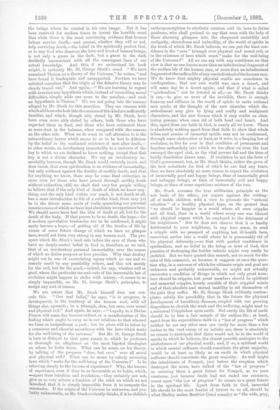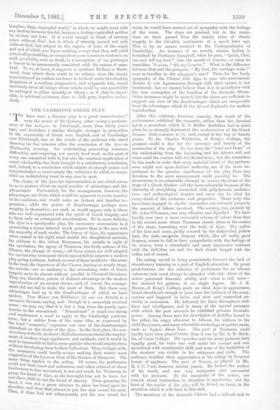IMMORTALITY WITHOUT GOD.
MR, ST. GEORGE STOCK, an accomplished Oxonian, who believes, though not without having found many cases of imposture, in those manifestations of invisible agents which are classed generally under the head of modern Spirit- ualism, has just published a book, called " Attempts at Truth,"* which invents for sceptics anew horror, a horror such as the scepticism of ancient times hardly ever conceived. A great many thinkers have contended that while there is the most absolute proof of the existence of a spiritually perfect God, there is no proof whatever of the continued existence after death of human beings. A great many have contended, that there is proof of both,—the existence of a spiritually perfect God, and the continued existence after death of
• Published by TrUbner and Co.
the beings whom he created in his own image. But it has been reserved for modern times to invent the horrible creed that while there is the most convincing evidence that human beings survive death,—and cannot, whether they will or not, help surviving death,—the belief in the spiritually perfect God, or in any God who deserves the love and trust of human beings, is not only a guess in the dark, but a guess in the dark decidedly inconsistent with all the convergent lines of our actual knowledge. And this, if we understand his book aright, is certainly Mr. St. George Stock's creed. " We have examined Theism as a theory of the Universe," he writes, " and have found it inadequate and unsupported. Further, we have satisfied ourselves that the origin of the delusive theory may be clearly traced out." And again,—" We are learning to regard with aversion any hypothesis which, instead of reconciling moral difficulties, simply adds one more to the number,—and such an hypothesis is Theism." We are not going into the reasons alleged by Mr. Stock for this assertion. They are reasons with which all those who look into discussions of this kind are sufficiently familiar, and which, though ably stated by Mr. Stock, have been even more ably stated by others, both those who have regarded them as final, and those who have estimated them as mere dust in the balance, when compared with the reasons on the other side. What we do want to call attention to is the extraordinary horror which seems to us to be lent to Atheism by the belief in the continued existence of men after death,— in other words, an involuntary immortality in a universe of the key to which we are declared to know nothing, except that that key is not a divine character. We say an involuntary im- mortality because, though Mr. Stock would certainly insist, and does insist, that even spiritualism is no evidence of immortality, but only evidence against the finality of earthly death, and that for anything we know, there may be some final extinction in store even for those who have passed. through earthly death without extinction, still, we shall find. very few people willing to believe that if the only kind of death of which we know any- thing, and the only kind within our reach, is not death at all, but a mere introduction to life of a subtler kind, there may yet be in the future some mode of really quenching our personal consciousness of which we have had absolutely no experience here. We should. never have had the idea of death at all, but for the death of the body. If that proves to be no death, the hope,—for if modern speculative tendencies arc to be confirmed,.it might easily become a hope,—of getting rid of the burden of life by virtue of some future change of which we have no glimpse here, would not burn very strong in any human soul. The pro- spect which Mr. Stock's book sets before the eyes of those who have no deeply-rooted belief in God is, therefore, as we said, that of an involuntary personal immortality, over the course of which no divine purpose or love presides. Why that destiny might not be one of excruciating agony which no one and no remedy could by any possibility relieve, and this not merely for the evil, but for the good,—indeed, for any, whether evil or good, whom the particular ins-and-outs of the inscrutable law of evolution might happen to strike with misery,—it seems to us simply, impossible, on Mr. St. George Stock's principles, to assign any sort of reason.
We are aware that Mr. Stock himself does not con- cede this. " Our real belief," he says, "is in progress, in development, in 'the tendency of the human soul, with all things else, upwards ; in a triumph, slow, but sure, over moral and physical evil." And again, he says :—" Loyalty to a Divine Person will some day become extinct as a manifestation of the feeling which ought to sway us in our relations to that whereof we form so insignificant a part ; but its place will be taken by a conscious and cheerful accordance with the laws which make for the well-being of the universe." But Mr. St. George Stock is here as disloyal to that pure reason to which he professes so thorough an allegiance as the most bigoted theologian on whom he looks down. What can he mean, on his theory, by talking of the progress "slow, but sure," over all moral and physical evil P What can ho mean by calmly assuming laws which "make for the well-being of the Universe P" Is he referring simply to the lessons of experience P Why, the lessons of experience, even if they be as favourable as he holds, which, e—apart from intuition and revelation,—they certainly are not, give us so very minute a fraction of the orbit -on which we are launched, that it is simply impossible from it to compute the remainder. If the origin of the Universe be unknown, and pro- bably unknowable, as Mr. Stock evidently thinks, if it be childish anthropomorphism to attribute creation and its laws to divine goodness, who shall pretend to say that even with the help of those alarming glimpses into the chequered amiability and malignity, shrewdness and imbecility, of the world of spirits in the truth of which Mr. Stock believes, we can put the least con- fidence in the " sure " triumph over physical and moral evil, or in the existence of laws which must " make for the well-being of the Universe P" All we can say with any confidence on that view is that no one knows more than an infinitesimal fragment of the endless life of the human race, or more than an infinitesimal fragment of the endless life of any one individual of the human race. We do know that mighty physical worlds are sometimes in conflagration ; that our own world. was once a desert, and will some day be a desert again; and that if what is called " spiritualism " can be trusted at all,—as Mr. Stock thinks it can,—to give us news of the invisible, there is enough knavery and silliness in the world of spirits to make rational men quake at the thought of the new stimulus which dis- embodiment may give to lying and crafty and malignant characters, and the new licence which it may confer on chat- tering gossips, when once rid of both head. and heart. And this, apart from our faith in God, is nearly all we know. There is absolutely nothing apart from that faith to show that whole tribes and armies of immortal spirits may not be condemned, through some obstruction or knot, as it were, in a limping law of evolution, to live for ever in that condition of permanent and hopeless melancholy into which we too often see even the best amongst the aged sink, as the vital powers fail and the time of bodily dissolution draws near, If evolution be not the form of God's government, but, as Mr. Stock thinks, rather the germ of the best substitute for God. of which he can find any trace, then we have absolutely no more reason to expect the evolution of immortally good. and happy beings, than of immortally good and unhappy beings, or than of immortally evil and happy beings, or than of some capricious mixture of the two.
Mr. Stock assumes the true utilitarian principle as the sole basis of his ethics, yet argues against the cutting- off of feeble children with a view to promote the "natural selection " of a healthy physical type, on the groUnd that " we should be happier in a world. where all were cripples and all kind, than in a world where every one was blessed with physical organs which he employed to the detriment of his neighbours." But he does not observe that it is hardly detrimental to your neighbour, in any true sense, to send a cripple with no prospect of anything but ill-health here, somewhat earlier into a world. where he is presumably rid of his physical deformity ;—so that with perfect confidence in spiritualism, and no belief in the being or laws of God, this practice of destroying the feebler infants might very easily be justified. But we have quoted this remark, not so much for ,the sake of this comment, as because it suggests at once the ques tion why, in a universe of which the ultimate origin and goal are unknown and probably unknowable, we might not actually encounter a condition of things in which not only great num- bers should. be cripples, but great numbers should. be spiritual and immortal cripples, keenly sensible of their crippled. minds and of their absolute and eternal inability to rid themselves of the pain they suffer. Mr. St. George Stock evidently contem- plates calmly the possibility that in the future the physical development of hereditary diseases, coupled with our growing disposition to cherish the weak and the suffering, might tend to a universal Crippledom upon earth. But surely the life of earth should. be to him a fair sample of the endless life ; at least, apart from his superstitious faith in a "law of progress" which neither he nor any other man can verify for more than a few inches in the vast sweep of an infinite arc, there is absolutely no reason to anticipate that there would not be in the world of spirits in which he believes, the closest possible analogies to the misfortunes of our physical world ; and, if so, a spiritual world. in which mental sufferers should constitute the great majority, would be at least as likely as an earth in which physical sufferers should constitute the great majority. As well might the inhabitants of Pompeii, just before the eruption which destroyed the town, have talked of the "law of progress " as securing them a great future for Pompeii, as we poor creatures, jest because death had not ended our existence, count upon "'the 12w of progress" to secure us a great future in the spiritual life. Apart from faith in God, immortal life should. be the most fearful of terrors to us all, should. be what Shelley makes Beatrice Cenci conceive as " the wide, grey, lampless, deep, unpeopled world," in which we might meet with any destiny however fearful, because a destiny controlled neither by wisdom nor love. It is awful enough to think of seventy years without God; but to think of eternity passed not only without God, but subject to the caprice of laws of the origin and end of which you know nothing, except that they will yield you, in all probability, no escape from your conscious existence, no such possibility even as death, is a conception of too grotesque a horror to be permanently consistent with the reason of man- kind. To us, at least, it suggests a spiritual Bedlam or Earls- wood, from which there could be no release, since the steady expectation of an endless existence to be lived under the absolute despotism of a soulless, purposeless, and enigmatic fate, would inevitably drive all beings whose minds could by any possibility be unhinged to either insanity or idiocy ; or, if that be impos- sible, in spiritual existence, then to chill, grey, hopeless melan- choly.








































 Previous page
Previous page